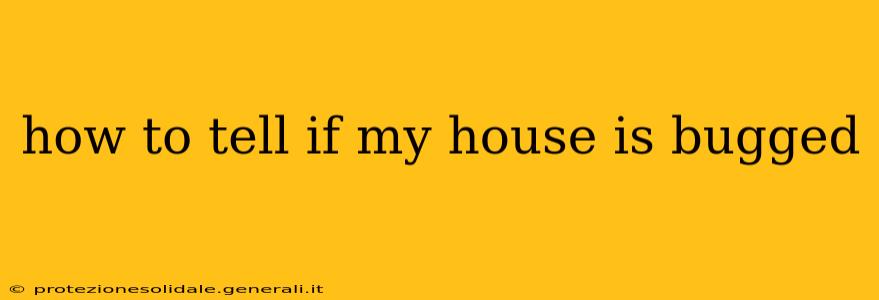Worried your home might be bugged? It's a legitimate concern in today's technologically advanced world. While paranoia isn't productive, understanding the signs and taking preventative measures can provide peace of mind. This guide will help you identify potential signs of surveillance and what steps to take if you suspect your privacy has been compromised.
What are the Signs My House is Bugged?
This is a crucial question, and unfortunately, there's no single, definitive answer. Many devices can be incredibly small and well-hidden. However, vigilance and attention to detail can help you identify potential issues. Look for these indicators:
Unusual Electronic Noises or Static:
Have you noticed strange clicking, buzzing, or static noises, particularly when no electronic devices are in use or near the source? This could indicate a listening device actively transmitting data. The sounds might be subtle and easily dismissed, but consistent unusual electronic noises warrant investigation.
Unexpected Changes in Wi-Fi or Network Activity:
If you notice your internet speed inexplicably slowing down, or you see unfamiliar devices connected to your Wi-Fi network, it could be a sign of unauthorized access. Check your router's connected devices list regularly. Unrecognized devices should prompt further investigation.
Strange Activity or Objects Out of Place:
This is a broader category but important. Observe your home carefully. Look for anything out of place, suspiciously placed objects, or signs of tampering, such as marks on walls, loose floorboards, or unusual dust patterns. Be particularly observant in areas you rarely use.
Unusual Phone Behavior:
Are your phone calls dropping frequently, experiencing static, or echoing even though the connection is usually clear? This could suggest a bug is interfering with your phone's signal. Also, be wary of unexpected changes in call quality or the presence of background noise.
Suspicious Behavior from Others:
While this might seem obvious, watch out for unexplained visits or actions from individuals you don't fully trust. Are certain people spending an unusual amount of time in your home or exhibiting unusual behavior? Trust your gut instinct; odd behavior often indicates something is amiss.
How to Check for Bugs in My House?
Suspecting a bug is one thing; finding it is another. While a professional sweep is always recommended for thoroughness, you can take preliminary steps:
Visual Inspection:
Thoroughly examine your home. Focus on areas like electrical outlets, light fixtures, smoke detectors, clocks, and even seemingly innocuous objects. Look for anything out of place, unusual wiring, or small, inconspicuous devices. Use a flashlight and a magnifying glass to aid your search.
Wireless Signal Detection:
Use a Wireless Signal Detector or RF (Radio Frequency) detector to scan for hidden transmitters. These devices can detect signals from hidden cameras, listening devices, and other surveillance equipment. Follow the manufacturer's instructions carefully.
Smartphone Detection Apps:
Several apps claim to detect hidden cameras and microphones. While their effectiveness varies, they can be a starting point for detection in combination with other methods. Research thoroughly to find reputable apps.
What Should I Do if I Find a Bug?
If you find something suspicious, do not touch it or attempt to remove it yourself. Doing so could potentially damage evidence or compromise any ongoing investigation. Instead, contact the relevant authorities immediately.
What if I Suspect But Don't Find a Bug?
If your suspicions remain but you haven't found anything concrete, consider consulting a security professional. They can conduct a comprehensive sweep of your home using specialized equipment and techniques to detect any hidden surveillance devices.
Can a Professional Help Me?
Yes, absolutely. Security professionals are trained to detect and remove bugs, ensuring your privacy is protected. They have access to advanced detection equipment and expertise that is beyond the capabilities of most individuals. Their services are your best recourse if you're serious about determining if your home is bugged.
This guide provides information for educational purposes only and is not a substitute for professional advice. Always consult with the appropriate authorities or security professionals if you have concerns about your privacy and security.
